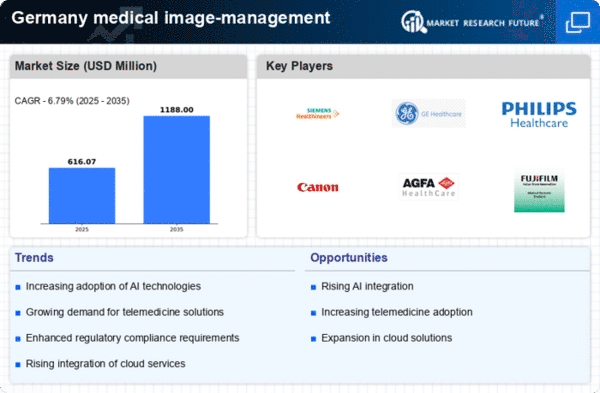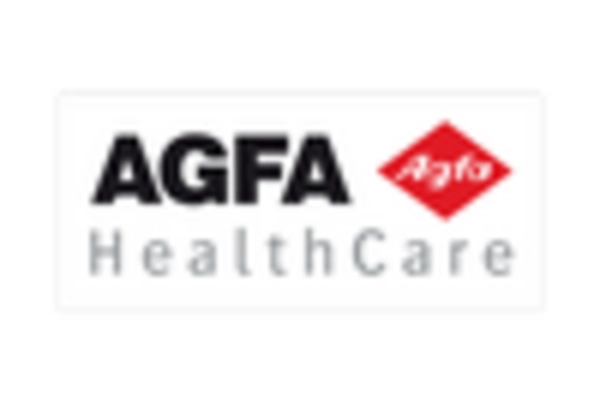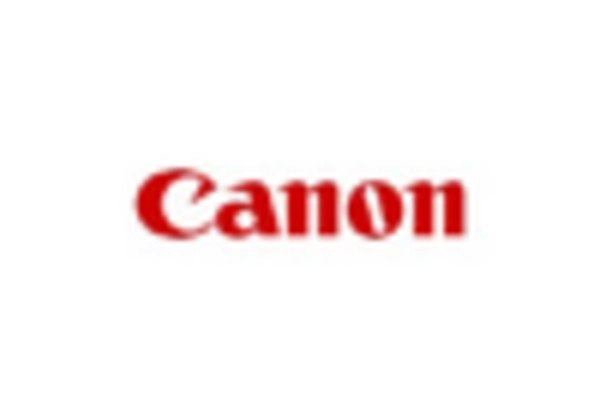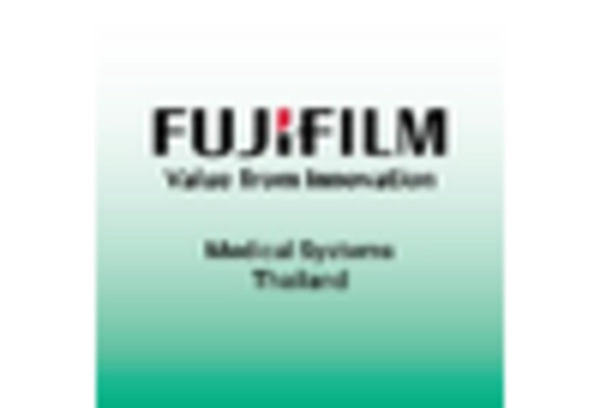Increased Focus on Patient-Centric Care
The medical image-management market is witnessing a transformation driven by an increased focus on patient-centric care in Germany. Healthcare providers are prioritizing patient engagement and satisfaction, which necessitates the implementation of efficient image-management systems. These systems enable timely access to medical images, facilitating better communication between patients and healthcare professionals. As a result, the market is expected to grow by approximately 12% annually, as providers seek to enhance the patient experience through improved imaging workflows. This shift towards patient-centric care is likely to encourage investments in innovative medical image-management solutions that streamline processes and improve overall healthcare delivery.
Rising Demand for Telemedicine Solutions
The medical image-management market is significantly influenced by the rising demand for telemedicine solutions in Germany. As healthcare systems evolve, the need for remote diagnostics and consultations has become paramount. The market for telemedicine is expected to grow at a CAGR of around 20% over the next five years, reflecting a shift towards more accessible healthcare services. This trend necessitates robust medical image-management systems that can seamlessly integrate with telehealth platforms, allowing for efficient sharing and analysis of medical images. Consequently, healthcare providers are increasingly investing in advanced image-management solutions to support telemedicine initiatives, thereby driving market growth.
Growing Investment in Healthcare Infrastructure
The medical image-management market is benefiting from growing investment in healthcare infrastructure across Germany. The government and private sector are increasingly allocating funds to modernize healthcare facilities, which includes upgrading imaging equipment and systems. This investment is projected to reach €5 billion by 2027, reflecting a commitment to enhancing healthcare services. As hospitals and clinics upgrade their imaging capabilities, the demand for advanced medical image-management solutions is expected to rise correspondingly. This trend indicates a robust growth trajectory for the market, as improved infrastructure facilitates the adoption of cutting-edge imaging technologies and management systems.
Technological Advancements in Imaging Techniques
The medical image-management market is experiencing a surge due to rapid technological advancements in imaging techniques. Innovations such as 3D imaging, MRI, and CT scans are becoming increasingly sophisticated, enhancing diagnostic accuracy. In Germany, the adoption of these advanced imaging modalities is projected to grow by approximately 15% annually, driven by the need for precise diagnostics in healthcare. This growth is further supported by the increasing prevalence of chronic diseases, which necessitate advanced imaging solutions for effective management. As healthcare providers seek to improve patient outcomes, the integration of these technologies into medical image-management systems is likely to become a priority, thereby propelling market expansion.
Regulatory Changes Favoring Digital Health Solutions
The medical image-management market is being shaped by regulatory changes favoring digital health solutions in Germany. Recent policies aimed at promoting digitalization in healthcare are encouraging the adoption of electronic health records and advanced imaging technologies. These regulations are expected to streamline the approval processes for medical devices and software, potentially increasing market accessibility. As a result, the medical image-management market could see a growth rate of around 10% over the next few years, as healthcare providers adapt to these regulatory shifts. This favorable environment is likely to stimulate innovation and investment in medical image-management solutions, further enhancing the market landscape.
















